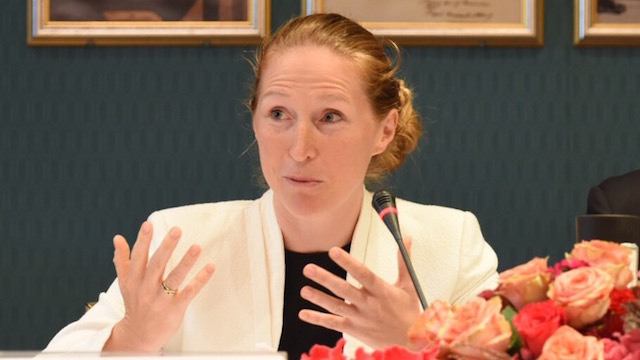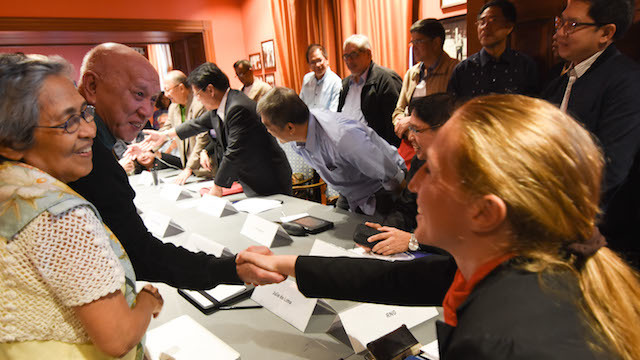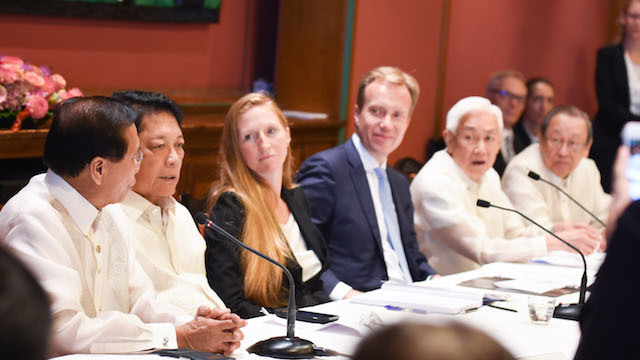Ambassador Elisabeth Slattum brings her experience from the successful Columbian peace talks to the Philippine peace process

FACILITATOR. Norwegian envoy Elisabeth Slattum assumed the role as facilitator of Philippine peace talks in 2014 and was behind an aborted attempt to revive it in 2015. Photo by Edwin Espejo/OPAPP
Norwegian Ambassador Elisabeth Slattum sat down with both panels from the Philippine government and the National Democratic Front (NDF) August 22-27 as facilitator of the negotiations that led to a historic joint statement on the resumption of talks and indefinite ceasefire.
Slattum is an experienced facilitator who was part of the initial secret negotiations between the Colombia government and FARC rebels, which resulted in the recently announced historic peace deal.
She assumed the role as facilitator of Philippine peace talks in 2014 and was behind an aborted attempt to revive it in 2015. (READ: Talks with Reds casualty of Mamasapano, too)
The recently concluded talks in Oslo was only the first of what is hoped to be several rounds of talks that the Philippine government aims to complete within a year.
Rappler's Carmela Fonbuena interviewed Slattum in Oslo to assess the prospects of ending Asia's longest running communist insurgency.
What is the role of Norway in the peace talks between the Philippine government and the communist rebels?
In general, when we are facilitating a peace process, we have our role as facilitator at the table which includes what goes on on the table and all the logistics of it. We host meetings, not only formal meetings like this, but also informal meetings and informal dialogues between the parties if there is a crisis or if the parties leave the table and they are too proud maybe to take the initiative to talk again. It’s good that a third party can invite them to come back to try to address the issues that made them separate in the first place. It is often easier for them to say yes to the facilitator than say yes to each other if there is a deep wound or there is a deep crisis.
Talks have collapsed too many times between the Philippine government and the communist rebels. What has kept Norway going?
We were asked by the parties to be the facilitator in 2001. For Norway, in our work on peace processes, we have a very long term mindset. We know that peace processes are marathons and not sprints. We believe that if there’s a chance, even if it’s not very big, that the parties can reach an agreement, we want to contribute to that happening. That risk is worth taking. That is our mindset especially when people ask us how much money do you spend on this. It takes a lot of resources but, in our view, conflict is one of the most important obstacles to development and it leads to so much human suffering. We believe that the money that we can spend on trying to prevent or solve conflict is money well spent.

CLOSED DOORS. Ambassador Elisabeth Slattum inside closed-door panel to panel meetings in Oslo. Photo by Edwin Espejo/OPAPP
How was it sitting down with negotiators of the warring parties?
The parties have conducted these peace talks with great dignity. I’m very impressed with the way that they’ve conducted their peace talks. They’ve shown a great amount of respect for each other, but they have also been constructive and solution oriented even when discussing very difficult matters. This is something that not only makes our job much easier. It gives great hope for the talks.
Norwegian foreign minister Borge Brende called them 'the most kind and the most warm negotiators.'
You can definitely feel that there is a great amount of trust between the parties. It is obvious there have been informal talks on the sidelines and that there has been prior contact between parties. You can feel that in the room because things are going really smoothly at the table. That helped, definitely. They seem to almost like each other.
For enemies in an armed conflict, it is rare to find that kind of constructiveness and mutual respect.
Did the friendly relationship between the two parties surprise you?
It is true that the parties are very able to often get along well in a human level but when it comes to substance, it doesn’t mean that they necessarily agree or reach an agreement. This time around they were very solution oriented. I think that the trust that they built between themselves definitely helped. In general, sometimes you might have to differentiate between the human level and the actual substantive level. They are definitely negotiators primarily.
What did you do when there were heated exchanges in the negotiating table?
I cannot comment on what goes on inside the room.
Are you optimistic that this time the talks will be successful?
I would say I’m cautiously optimistic. I think this joint statement was unprecedented and historic. It’s a very promising start, but at the same time we have very difficult issues ahead. I’m very happy that the parties have been able to tackle some of the procedural issues that have been blocking the peace process for a long time, and I’m very glad that parties will now be able to address substantive issues.

GREAT START. The Philippine government and the National Democratic Front signed on August 26, 2016 a joint statement on resumption of talks and indefinite ceasefires. Photo by Edwin Espejo/OPAPP
Norway also facilitated the historic peace deal between the Colombian government and the FARC rebels.
The Colombian peace talks, the secret phase or the very informal phase, started in 2011. I was part of the team from Norway that facilitated the talks between the FARC guerrilla and the government in the secret phase and also in the formal phase until I started this job [in 2014]. It’s so great. We are extremely happy. Finally, after 5 years of of talks we finally have a peace. They had almost continuous talks. FARC lived in Cuba all those years and the government negotiators traveled forth and back between Colombia and Cuba. They had very frequent meetings to address the root causes of conflict.
Can you compare the two peace talks?
We’ll see how. This is just the start [of the Philippine peace talks]. We haven’t really started discussions on substance. We don’t have a framework yet. We’ll have to see, I think. But there seems to be right now a similar level of commitment especially from the President’s side.
The President is always a big factor?
Oh, very much. Both sides need to have that strong decisiveness, determination and commitment. There will always be crisis and reasons to walk out, but you need that commitment to stay at the table. This is what we will see also in this peace process: If that commitment is so strong that no matter what happens on the ground, the parties will not leave the table.
In the Colombian peace process, in the beginning of the secret talks, the leader of the FARC was murdered. He was killed by the military. We thought maybe that was it. It was not going anywhere. But FARC returned to the table, and today we have a peace agreement. It's the same with the government. A general was kidnapped and they reacted very strongly, but they did never leave the table. So you need that level of commitment.
No matter how desperate, you don't give up.
You need that patience and determination, but you also need a willingness to take risks because there are a lot of stakes in peace proceses. Both sides will probably have to make decisions that might not be popular in all sectors of society, but it is important to be able to take those risks.
http://www.rappler.com/nation/144481-norway-envoy-cautiously-optimistic-philippines-talks

No comments:
Post a Comment
Note: Only a member of this blog may post a comment.